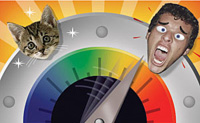sierraclub.org - sierra magazine - may/june 2012 - a race of superbugs
Smart-Meter Backlash | Year of the Draco | Water, Water Everywhere | Summer Barbecues |
Superbugs | Up to Speed
A Race of Superbugs
 John Ueland
John Ueland
Thanks to antibiotics in our excretions, the fertile mating grounds of wastewater treatment plants, and the balmy temperatures of a changing climate, water-borne bacteria are becoming superbugs. Particularly worrisome is the upswing in diseases caused by Vibrios, the genus of bacteria responsible for seafood poisoning, gastroenteritis, and cholera.
Swimmers with open wounds are susceptible to Vibrio infections—and the number of such cases is increasing. The mortality rate for systemic infection from Vibrio vulnificus is more than 50 percent. "It's a toss of the coin whether you survive or not," says Craig Baker-Austin of the U.K.'s Centre for Environment, Fisheries, and Aquaculture Science.
Baker-Austin has found that Vibrio infections go up during heat waves, which are becoming more common. The microbes may also be growing hardier. In one study of bacteria collected along the coasts of Georgia and South Carolina, he and his colleagues found that a quarter of their samples of Vibrio parahaemolyticus—the cause of about 4,500 U.S. cases of shellfish poisoning each year—were resistant to 10 or more antibiotics.
Professor Chuanwu Xi of the University of Michigan's School of Public Health looked at species of Acinetobacter (a major cause of hospital-acquired infections) in Ann Arbor's wastewater treatment plant and found strains resistant to all eight antibiotics he tested.
While resistant Acinetobacter strains pose a major threat, Baker-Austin says that resistant Vibrios aren't yet a major health concern—unless you've gotten a blood infection from V. vulnificus. "These infections are very rapid," he warns. And you'd better make sure you get treated with the right antibiotic. —Dashka Slater
Up to Speed